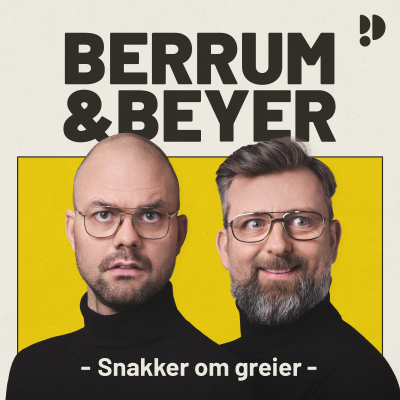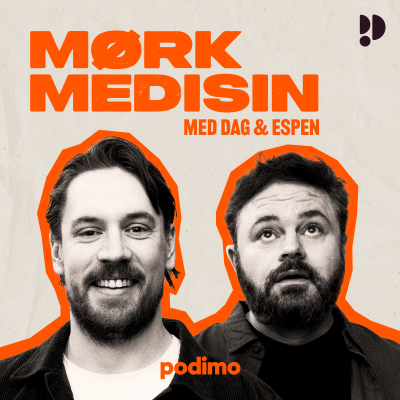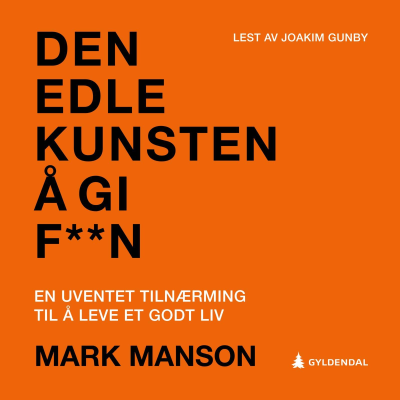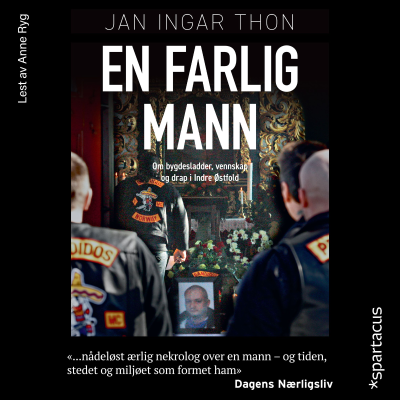
TheInquisitor Podcast with Marcus Cauchi
Podkast av Marcus Cauchi, Laughs Last Ltd
Tidsbegrenset tilbud
2 Måneder for 1 kr
Deretter 99 kr / MånedAvslutt når som helst.
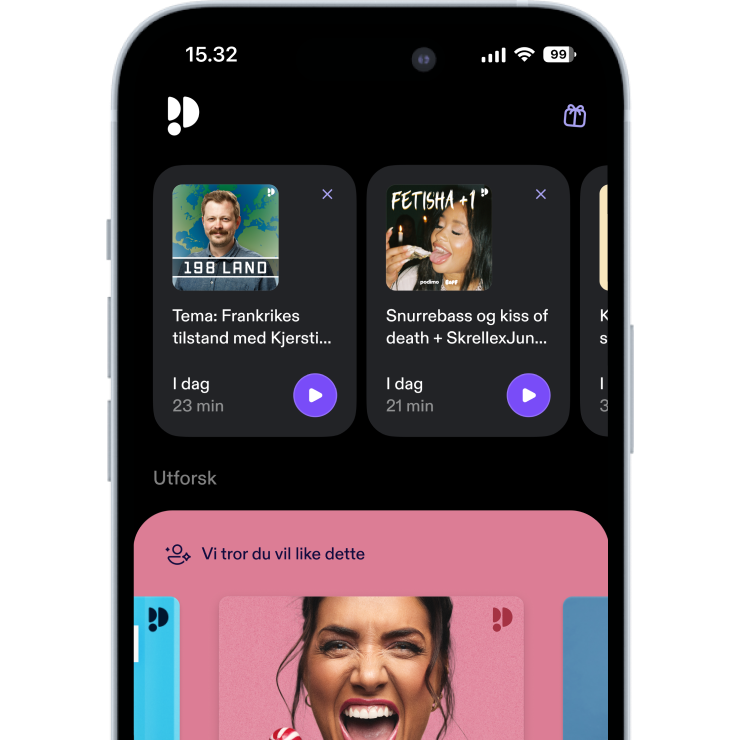
Mer enn 1 million lyttere
Du vil elske Podimo, og du er ikke alene
Rated 4.7 in the App Store
Les mer TheInquisitor Podcast with Marcus Cauchi
Business Insights & Strategies From Experts: Unveiling Simple Truths Behind Success. I’m always grateful for Reviews and remember to Subscribe
Alle episoder
551 EpisoderStanding Out in a Sea of Sameness - Selling with Relevance, Integrity, and AI Key Themes and Takeaways 🔹 Use AI to elevate, not replace, your thinking Ryan explains how he uses tools like Claude to extract specific language from a prospect’s online footprint. LinkedIn posts, articles, podcasts and craft bespoke messaging. It’s not about pumping out generic templates. It’s about using AI as a research and ideation partner to move faster and personalise better. 🔹 Ditch mass outreach. Embrace hyper-personalisation. Spraying generic messages doesn’t build trust. Ryan shares how a handful of well-crafted, highly relevant outreaches can beat a thousand emails. Loom videos, thoughtful angles, and sharp research help him connect with hard-to-reach buyers. 🔹 Sell to the solution-aware Why waste time with prospects who don’t even know they have a problem? Ryan suggests targeting those already looking the ones who’ve tried other solutions, failed, and are ready to buy something better. Focus on intent, not just interest. 🔹 Stop bulking up your pipeline to look busy A bloated pipeline might make dashboards look good, but it hides weak deals and wasted effort. Ryan advocates for qualifying with integrity walking away early from bad-fit opportunities rather than clinging on and discounting to win. 🔹 Be customer-centric, not submissive Being buyer-first doesn’t mean saying yes to everything. Ryan holds his line on pricing by anchoring the conversation in unique value and clear outcomes. He explains how long-term thinking and strong qualification eliminate the need for last-minute discounting. What’s Broken in Modern Sales (and How to Fix It) Ryan and Marcus also dig into the systemic issues plaguing sales and marketing: * Me-too messaging: Large Language Models regurgitate what’s already out there, so unless you feed it something original, you’ll end up sounding like everyone else. * Misused metrics: Activity-based KPIs (dials, emails, sequences) drive volume, not outcomes. Ryan calls this “ludicrous maths” too many inputs, not enough impact. * Marketing irrelevance: Most messaging lacks relevance, timeliness, or personal value which is why it gets ignored. Strategies That Actually Work * Speak directly to your buyer’s real-world problems — avoid “expert language” * Define your ICPs very specifically (e.g. startup CEO vs enterprise CTO) * Use storytelling, curiosity hooks, and polarising opinions to stand out * Create marketing that guides the buyer through their journey: from problem-aware to root-cause aware to solution-aware * Build a unique methodology that makes you a "category of one" What Drives Ryan - Beyond Sales * Take faster, imperfect action * Stop overthinking pitches and outcomes * Ask for help, personal and professional This episode is ideal for sellers, marketers, and founders who want to: * Cut through digital noise * Sell without chasing * Use AI responsibly * Build long-term buyer trust Contact: Ryan Clark | LinkedIn [https://www.linkedin.com/in/ryanhamiltonclark/] Marcus Cauchi | LinkedIn [https://www.linkedin.com/in/marcuscauchi/] Book 15 minutes with Marcus [https://calendly.com/marcuscauchi/let-s-explore-coaching-training]
In this episode of The Inquisitor Podcast, host Marcus Cauchi speaks with Michael Davis-Marks, a veteran of the Royal Navy who commanded a nuclear-powered submarine and now focuses on leadership development and advocating for the veteran community. They discuss decision-making under pressure, the unique transferable skills veterans bring to civilian life, and the critical differences between traditional and effective leadership models like servant leadership. The conversation highlights the importance of training, teamwork, delegation, building trust, and fostering a culture where people feel valued and empowered to do their best work. * Michael Davis-Marks: Spent 36 years in the Royal Navy, primarily as a submariner, including commanding a nuclear-powered submarine. Served in the British Embassy during 9-11. Since leaving the Navy 13 years ago, he has focused on leadership development and culture. He is also the managing editor of TheVeteran.uk, a publication that gives voice to the veteran community. His mission is to amplify the lived experience of veterans, challenge outdated stereotypes, and advocate for what armed forces veterans can offer to organisations, employers, and society. Key Discussion Points: * Veterans as a Valuable Asset: Veterans possess extraordinary transferable skills such as leadership, teamwork, discipline, and commitment, which can be enormously helpful to organisations and society as a whole. There are approximately 2.2 million veterans in the UK, about a million of whom are of working age, representing a significant pool of talent. * Challenging Stereotypes: The common stereotype of military people as "Colonel Blimp" or a "shouty sergeant" is inaccurate for the vast majority of veterans. * Veteran Mindset: Many veterans, including Michael, don't initially realise how much they have to offer civilian life due to a self-effacing mindset developed through military training that prioritises the team over the individual. * Decision Making Under Stress: The military trains individuals to remain calm and think clearly in high-pressure situations. The ability to make good decisions under stress is crucial and can be developed through training and building resilience. * Leadership Defined: Leadership is not about telling people what to do. It's about motivating and inspiring people, helping them become better versions of themselves. * Servant Leadership: This model posits that the leader is there to serve the people subordinate to them, helping them realise their full potential. It's about looking after the people in your charge, not just being in charge. * Delegation vs. Abdication: Leaders who spend their time "doing" are stealing learning opportunities and growth from their people. Empowering people to work things out for themselves, rather than always providing the answer, is crucial for development. Michael's rule was "don't bring me problems, bring me solutions". Allowing people to "have a go," even if they make mistakes in a safe environment, fosters learning. * Creating Conditions for Trust: Trust begins with the leader's self-awareness, emotional intelligence, and empathy. It is developed by assigning low-risk tasks initially, being a mentor and coach, gently nudging rather than directing, and providing encouragement and positive feedback. * Leadership is Trainable: While some may be "born leaders," leadership skills can be taught and developed through training and practical experience. Openness to feedback and the realisation that one is not perfect are key to improvement. * The Staircase of Learning: This concept describes the progression from unconscious incompetence (not knowing what you don't know) through conscious incompetence and conscious competence to unconscious competence (second nature). Training and repetition are critical to moving through these stages and building resilience. * Continuous Improvement: In the military, standard operating procedures were changed "all the time" because you can't stand still; "every day is a school day". Agility of thought is essential because plans often don't survive first contact. * The Leader's Role: The leader's job is to create the conditions for their people to do their best work. Delegating tasks to competent people allows the leader to step back, maintain a strategic view, and avoid becoming a bottleneck or single point of failure. * The Importance of People: People are the most important asset in any organisation, not just numbers on a spreadsheet. Treat them as people. A high staff retention rate is often a sign of a happy and well-led company. People frequently leave jobs because of their boss, particularly if the boss prevents them from doing their best work. Beating people does not improve morale. * Advice for New Managers: "Get Off Your Arse" (GOYA) is crucial advice. New managers should spend their initial time listening, walking around, asking curious questions about what people do, what they like/dislike, and what can be improved. Taking notes shows you are listening and helps you remember. Getting out and talking to people makes them feel important and that they belong. This approach should be routine, not just for the first few days. * Lesson for a Younger Self: Michael would tell his 23-year-old self that he knows much less than he thinks and is surrounded by people who can help. He would advise working on relationships with others to learn and grow together as a team, emphasising that people are the most important aspect in everything. Recommended Resources: * "Turn the Ship Around" by David Marquette (Discusses an "I intend to" model of leadership empowering the team). * "Always Start With Why" by Simon Sinek. * "Leaders Eat Last" by Simon Sinek (Highlights the principle of leaders serving those who rely on them). * TheVeteran.uk: Publication giving voice to the veteran community. * Connecting with Michael Davis-Marks on LinkedIn
In this episode of The Inquisitor podcast, host Marcus Cauchi interviews Edward Ingham about his journey from traditional, product-focused sales to a more customer-centric approach. The conversation delves into the real-life moments that shaped Edward's shift and the practical impact it has had on his career and well-being. Guest: Edward Ingham, Senior Sales professional (biopharm-bd.com) About Edward: Edward is a dual national British-Spanish salesperson based in Madrid, with 10 years of experience selling into enterprise pharma and startups. He has observed recurring sales themes across different company sizes and has learned significant lessons from his experiences. Key Discussion Points: * The Epiphany Moment: Edward realised the need for change about five years into his sales career. This shift occurred when he stopped focusing on the technical aspects of the product and the prospect's role (like CBO or CEO) and instead looked inward, considering how his own actions were affecting the other person, viewing them as human beings. He began to think about how he would feel if someone was doing what he was doing to them. The second part of this transition was spending time to truly understand the prospect's world, recognising that they don't make impulse purchases and need to "sell" internally within their own organisation to get things done. * Breaking Point: The old way of selling became unbearable, particularly during lockdown, when facing constant rejection alone in an apartment led to self-doubt. This coincided with him starting to listen to The Inquisitor podcast, which offered a new perspective on questioning people to understand their situation. The sense of rejection was the most difficult part of the old approach. * Understanding Buyer Behaviour: Marcus highlights that buyers don't reject the salesperson, proposition, or product itself, but rather the uncertainty and lack of safety associated with the decision. Buyers want to make the right decision effectively and know that a purchase will deliver the intended outcome. Creating false urgency creates distrust. * Learning and Improvement: Edward learned from ghosting experiences that prospects are not necessarily "mugging you off," but often have internal issues or priorities that take precedence. The key is to probe and ask tough questions (nicely) to understand the prospect's reality and qualify or disqualify opportunities early. This prevents "bulking up" pipelines with uncertainty, which can negatively impact forecasting up to the board and investors. * Becoming an Ally: The moment of realisation that his job was to be the customer's ally, not their accomplice or adversary, came from slowly implementing client-centric approaches and seeing immediate positive results. Switching the tone in emails or meetings led to responses from non-responders, positive reactions, and feeling appreciated in the room. * The Power of Client-Centricity: Edward found that adopting a client-centric approach, treating prospects as human beings with emotions, helps overcome imposter syndrome, especially for those without a deep scientific background in technical industries like pharma. This approach serves as a unique differentiator against salespeople who product push. Clients appreciate honesty, like direct answers to questions such as "Who is better, you or your competitor?". * Improved Results: A major difference seen is that very little unqualified opportunity enters the pipeline. By asking questions and understanding the client's position and internal readiness, opportunities are typically only added at a later stage (like "submit proposal"). This results in a very high close rate for opportunities that do enter the CRM. This certainty is valuable for communicating upwards within the company. * Prospecting for Life: Shifting the mentality from transacting or booking meetings to prospecting for a customer for life changes the entire conversation tone. The focus is on genuinely understanding the other human being and their pressures. * Client Reaction and Referrals: When this shift occurs, people actually want to spend time with you and become just as invested in the conversation. The feeling of needing to chase disappears. Edward receives messages directly from prospects on their personal phones. He finds he needs to do less work on accounts because internal people know he isn't difficult to work with and will help them internally. People who were historically bombarded may reach out, demonstrating that less work structured differently leads to inbound interest. * Activities Eliminated: Edward no longer wastes hours with "tire kickers" or spends time on "just checking in" follow-up emails. This time is reinvested in self-improvement or sales enablement. The customer-centric approach reduces waffle and uncertainty in pipeline discussions. * Doing the Right Thing: A principled approach includes the absolute minimum gesture of honesty, such as advising a prospect that a competitor might offer a better, cheaper, or quicker solution if their request is out of scope. This is uncommon but helps differentiate a salesperson and build long-term memory with the prospect. * Impact on Self: Being human-centric makes you a lot happier. You go home feeling like you've helped someone, which is often the antithesis of traditional sales. Done well, sales is about facilitating good decisions and empowering people. * Engaging Broadly: Edward aims to engage with around 12 or more people within an account over the medium term, having interactions not solely focused on the sales process. It's important to get in touch with key people (like procurement or legal) before you need something from them. * Working with Procurement: Edward learned that engaging with procurement with purely their interests at heart is pivotal. They are trying to save the company money and have specific KPIs; understanding these can help make their life easier and create internal advocates. * The Power of Mentorship: A critical move was seeking mentorship from people he had previously interacted with, particularly those he might have "pissed off" as a salesperson, or people in roles like procurement. He crafted concise LinkedIn messages asking for 15 minutes a month of mentorship with "no strings attached" and a promise not to abuse the goodwill. The response rate has been incredibly high (above 90%). This provides invaluable insight into the customer's world, their internal pressures, and the emotional factors influencing decisions. * No Need to Discount: Edward learned that discounting feels insincere and is effectively "lying to people". It should be avoided at all costs unless value has been clearly delivered and the prospect understands they need the product. Discounting hurts cash flow, forces more prospecting, and procurement remembers suppliers who are quick to discount. * Owning Your Development: Edward advises people who are waiting for company training to stop pointing the finger. It is the individual salesperson's responsibility to train themselves. Finding role models (through podcasts, content, reaching out) and making yourself vulnerable by seeking feedback are key. * How You Sell Matters More: Both Edward and Marcus agree that how you show up and how you sell matters more than what you sell. The intent behind the interaction will be remembered, not the technical details of the product. * The Real Issue: The fundamental issue in sales is often time and relevance for the prospect at a given point in time, not the product itself. * Becoming a Board Director: Edward's recent transition to a board director highlights the value of having frontline sales perspectives on boards, providing insights into market dynamics and customer reactions that senior execs might not have due to being removed from daily sales interactions. * Final Challenge: Stop product pitching and focus on the prospect's world, their agendas, and their life. Treat them as human beings, understanding their needs and priorities, not just focusing on your own targets. Recommendations for Further Learning: * Books: Demand Side Sales by Bob Moesta, Trust-Based Selling by Charlie Green, The Other Side of Sales by Mark Schenkeus, How to Make Friends and Influence People. * Podcasts/Content: We Have a Meeting (WAM guys), Benjamin Dennehy, Jerry Hill. * Community: Veblen Community (Callum Lang). * Networking: Seek mentors through respectful outreach. Consider Sellers Anonymous. How to Connect: * Edward Ingham: edward.ingham@biopharm-bd.com or reach out on LinkedIn. * Marcus Cauchi: Get in touch regarding Sellers Anonymous or the Career Pathfinder. The conversation highlights the transformative power of shifting to a truly human-centric and principled approach in sales, leading to increased effectiveness, personal fulfillment, and stronger customer relationships.
In this episode, Marcus speaks with Avner Baruch about the invisible costs of misalignment in go-to-market functions and why focusing on traditional sales metrics like ARR and conversion rates often misses the point. Avner shares his journey into sales enablement and how it led him to develop a methodology called Project Moneyball, which digs beneath surface metrics to uncover the real issues. By factoring in soft skills, time management, and process adoption, this approach helps teams identify problems much earlier, often during onboarding, rather than waiting months for reports to catch up. Key Themes Explored: 🔸 The Real Cost of Misalignment Misalignment across sales, marketing, and customer success leads to noisy pipelines, stalled deals, wasted effort, and poor customer experiences. Avner explains how one company saved over $1 million a year by fixing inefficiencies at the top of the funnel. Marcus adds that leaving customer success out of the GTM strategy is a massive oversight that leads to direct and indirect waste. 🔸 Outdated Metrics and Misplaced Incentives They challenge the use of legacy metrics like booked meetings and conversion rates for SDRs, which often encourage the wrong behaviours. Instead, the focus should be on quality meetings with Ideal Customer Profiles who are a genuine long-term fit. 🔸 Smarter ICP Design Avner recommends using customer success data to define what a great customer actually looks like, then feeding that back to marketing. This creates a more focused ICP, a cleaner pipeline, and a more effective use of resources. 🔸 Leadership in Uncertain Times When things get tough, leaders often make panic moves like reshuffling teams or jumping on automation tools without fixing broken processes. They also tend to reuse job descriptions from failed roles, which sets up new hires to fail. Avner argues for proper job design based on desired outcomes, with hiring managers involved from the start. 🔸 Managers as Multipliers Managers should be hiring well, removing friction, building systems that work, and actively coaching. Enablement is not just a department, it’s a mindset. Research shows that operational coaching by frontline managers delivers strong ROI and better outcomes. 🔸 Cultural and Structural Blind Spots They dig into leadership behaviours that hold teams back, including ego, resistance to feedback, fear of hiring strong people, and a desire to avoid conflict. These behaviours lead to bloated pipelines, poor handovers, low trust, and declining performance. 🔸 Spotting and Fixing the Gaps Leaders need to put a number on the cost of the current way of working. That includes symptoms like pipeline bloat, poor onboarding, high churn, CS teams carrying too much weight, and inconsistent sales performance. Avner and Marcus outline practical steps like watching early-stage calls, examining handoffs, and separating SDR and BDR roles to allow for real skill development. 🔸 CRM and Forecasting They question the value of traditional weekly forecasting meetings, which often provide little insight and lots of theatre. Tech should be used to provide real-time, actionable data, not just serve management dashboards. CRMs should make selling easier, not add friction. 🔸 The Human-Centric Leadership Advantage The conversation ends with advice to listen, seek feedback, hire well, and drop the armour. Vulnerability and trust are not weaknesses. They’re essential for building teams that are resilient, motivated, and capable of delivering sustainable growth. 📚 Avner’s books The Top Sales Enablement Challenges and The Multiplier explore these topics in more detail. He and Marcus also talk about a potential collaboration to help private equity firms measure "alpha drift" caused by inefficiencies in go-to-market execution. If you’re a sales or revenue leader tired of vanity metrics and poor alignment, this episode gives you clear, practical ideas on how to fix what’s broken and build a go-to-market function that actually works. Contact Avner https://www.linkedin.com/in/avner-baruch/ [https://www.linkedin.com/in/avner-baruch/] Marcus https://www.linkedin.com/in/marcuscauchi/ [https://www.linkedin.com/in/marcuscauchi/] or Email team@laughs-last.com [team@laughs-last.com] if you'd like to know more about pipleline triage
In this episode, Marcus is joined by Alan Versteeg, a coach and sales performance specialist with years of experience helping companies unlock what's really holding their teams back. Together, they explore 9 critical truths most sales leaders overlook, and the hidden leverage points that can transform your results without overhauling your tech stack or doubling your headcount. What you'll learn: * Why your middle managers are your most underused asset, and how to activate them * How on-the-job coaching delivers a 72x return when done right * The dangerous illusion of control CRMs create, and what to focus on instead * How shifting from managing individuals to managing the sales environment changes everything * Why asking basic questions like “Why do we prospect?” can unravel deeper issues in your sales process * How to identify the handbrakes slowing growth, often hidden in plain sight * Why failure is your most powerful tool, if you build the right culture around it * The key difference between managing tasks and driving impact * And how changing perspective can make the difference between short-term wins and long-term performance If you're a CRO, VP of Sales, or leading a team in a mid-market organisation, this episode is packed with practical, thought-provoking insight you won't get from dashboards or sales playbooks. Connect on LinkedIn https://www.linkedin.com/in/alanversteeg/ [https://www.linkedin.com/in/alanversteeg/] https://www.linkedin.com/in/marcuscauchi/ [https://www.linkedin.com/in/marcuscauchi/] Get Personal Sales Insights https://bit.ly/NewSellingAptitudeTest [https://bit.ly/NewSellingAptitudeTest] Triage Your Pipleline https://bit.ly/PipelineTriageAudit [https://bit.ly/PipelineTriageAudit] Or https://bit.ly/TalkWithUsNow [https://bit.ly/TalkWithUsNow]

Rated 4.7 in the App Store
Tidsbegrenset tilbud
2 Måneder for 1 kr
Deretter 99 kr / MånedAvslutt når som helst.
Eksklusive podkaster
Uten reklame
Gratis podkaster
Lydbøker
20 timer i måneden



